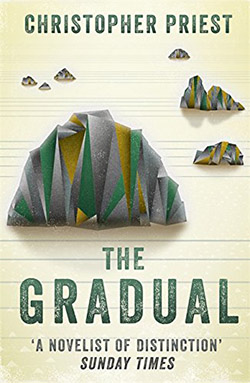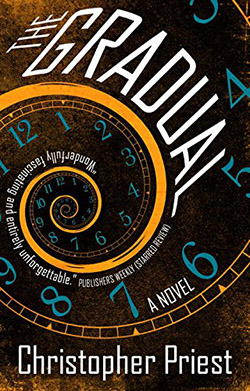Pro tip, folks: never, ever, ever ask artists where they get their ideas from. It’s not a trade secret or anything so sensational—it’s just a silly question in the eyes of the aforementioned, and at best, silly questions beget silly answers, such as the bit about the Bognor Regis-based ideas dealer Neil Gaiman used to use. The fact of the matter is that art is inherently personal, and people, whatever their superficial similarities, are completely unique, so what inspires one person in one way isn’t likely to inspire another, and if it does, it’ll be differently.
That’s just one of the lessons the eventually-fêted composer Alesandro Sussken learns in The Gradual: a dreamlike diatribe on the source of song and scene and story and so on, arranged, somewhat like a literary symphony, around one man’s lifelong journey through the tides of time.
Like The Islanders and The Adjacent and a bunch of other Christopher Priest books before it, The Gradual takes place in the Dream Archipelago, which is to say “the largest geographical feature in the world, comprising literally millions of islands.” The Susskens—a family of musicians, mostly—live on Glaund, which is at war with Faiandland, and has been for as long as anyone can remember, for reasons no one can rightly recall. This sort of thing is not uncommon in the Dream Archipelago, so Alesandro doesn’t take it too personally… that is, until his older brother Jacj is enlisted.
Years pass. Indeed, decades do:
Jacj’s absence was eternally in the background of everything I did. Whatever had happened to him gave me feelings of dread, misery, horror, helplessness, but you cannot work up these emotions every day, every hour. I feared for him, was terrified of the news that I felt would come inevitably: he was dead, he had gone missing in action, he was horrifically wounded, he had deserted and been shot by officers. All these I pondered.
Yet the time went by…
As time tends to. Inevitably, Alesandro has to direct his energies elsewhere, and perhaps it’s the fact that Jacj may yet be out there somewhere that leads to our hero’s first fascination with the world outwith his. He becomes particularly interested in the three islets visible from Glaund’s shores—with Dianme, Chlam and Herrin:
Facts about the Dream Archipelago were hard to come by and fragmentary, but I was slowly piecing together what I could. I knew, for instance, that as a citizen of the Glaund Republic I would be forever forbidden from crossing to any of those islands. Indeed, the Archipelago, which I learned circled the world, was a closed and prohibited zone. Officially, it did not exist. However, the islands were in fact there, were neutral territory in the terms of the war Glaund was involved in, and their neutrality was fiercely protected by their local laws and customs.
Alesandro is so struck by these three islands, there but not there, that he writes some music about them: a quartet that expressed “both the quietude of the seascape as I perceived it from the shore, and the feelings of defeat induced in me by the denied existence of the islands.” A lot of locals quite like it, but farther afield, there are those who come to love it—and some, such as the rock musician And Ante, love it so much that they imitate it for their own gain.
 Initially, this unsettles Alesandro, and although his frustrations fade as he ages, he never forgets, so when our increasingly well-known composer is invited to participate in a musical tour of the Dream Archipelago, he grasps the opportunity with both hands. He imagines it will give him a chance to confront And Ante, to find out what happened to Jacj, and last but not least, to see whether reality is a match for his fantasies:
Initially, this unsettles Alesandro, and although his frustrations fade as he ages, he never forgets, so when our increasingly well-known composer is invited to participate in a musical tour of the Dream Archipelago, he grasps the opportunity with both hands. He imagines it will give him a chance to confront And Ante, to find out what happened to Jacj, and last but not least, to see whether reality is a match for his fantasies:
I had spent so much of my time dreaming and fantasising about the islands that I had created a plausible but totally imaginary Dream Archipelago in my mind. I had drawn music productively from these fantasies, but would the reality live up to the dream?
Does it ever?
By design, I dare say, The Gradual is more like a dream than reality. It ebbs and flows, speeds along and then suddenly slows. Things that can’t happen happen—like the ten years Alesandro loses during the ten month tour that is the pivot-point of this novel—and that’s that. Conflated characters float in and out of focus, talk in tongues and act as if everything they’ve said makes perfect sense… then, before you could possibly have cottoned on to what’s going on, it’s gone, and the dream’s moved on.
No surprise, then, that as a narrative, The Gradual doesn’t satisfy in the classic fashion. It’s relatively eventful at the outset, but less and less as the novel progresses. It doesn’t have much momentum, and in its slow moments seems positively stodgy. It’s confusing before it’s clear, maddening before it’s mysterious. You’ll come out of the singular experience of reading it with more questions than you went in with—but read it you should, to be sure, because like a dream, baffling though it may be, it really could renew you. Intellectually, yes—the extraordinary ideas The Gradual explores are, as ever, brilliantly belied by the plainness of Priest’s prose—but also intimately.
Like the gradual itself—”a kind of endless, inexplicable madness” that has something to do with the tempestuous relationship between time and space in this place—Priest’s latest take on the Dream Archipelago is “difficult to understand rationally [and] impossible to comprehend emotionally,” but if you simply let it sit, you might just get a glimpse of it, and a glimpse is more than most artists are able to share:
Music for me was the voice of the human spirit. It existed only in the space between the instruments that produced it and the ear that appreciated it. It was the movement and pressure of molecules of air, dispersed and replaced instantly and unceasingly. It lived nowhere in reality: gramophone records, digital discs, were merely copies of the original. The only real record that existed of music was the original score, the black pen marks on the staves, but they were cryptic, had no sound, were written in code—they had no meaning without the human spirit that could break the code, interpret the symbols. And music survived not only the lives of those who played it, but the life of the man or woman who composed it.
The Gradual is a great many things—exhilarating, frustrating, hypnotic, semiotic—but above all else, it’s an inspiring novel about inspiration.
The Gradual is available now in the UK from Gollancz and publishes September 27th in the US with Titan Books.
Niall Alexander is an extra-curricular English teacher who reads and writes about all things weird and wonderful for The Speculative Scotsman, Strange Horizons, and Tor.com. He lives with about a bazillion books, his better half and a certain sleekit wee beastie in the central belt of bonnie Scotland.










